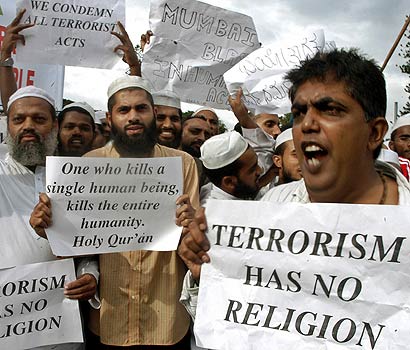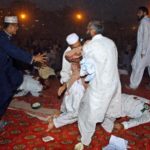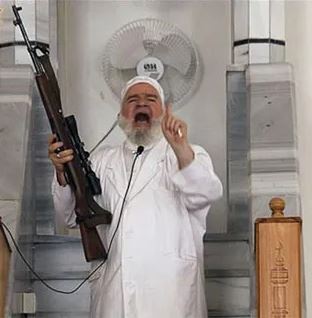
Before entering into discussions or debates about the particularities of religious discourse, we first have to establish whether the crisis of terrorism is at base a religious crisis, aside from there being some connection between it and our religious discourse.
TERRORISM IS NOT merely a matter of criminal behaviour to be explained by natural instincts or human necessities, rather in essence it is a form of behaviour that derives from religious beliefs deeply rooted in the consciousness of the believer, something that can drive them to sacrifice the most precious thing they own – their lives – for its cause in the belief – held with the upmost religious certainty – that they are going towards a life that is immeasurably better than this one.
Of course to be certain about the influence of religious belief is not to dismiss other influences and stimuli such as poverty, unemployment, oppression and so on. It simply means that, in comparison to the religious influence, these are secondary factors. The act doesn’t necessarily follow from these factors since one cannot in all reason find a youth suffering from poverty or unemployment who then sees no other solution to his frustrations other than to blow himself up, and in the process kill dozens of innocents. Some one suffering from frustration might indeed kill himself in exceptional circumstances, yet if he takes innocent people along with him to a pointless death, this cannot be explained as an act of frustration.
It may be that the the fact that many well-to-do youths who join terror groups and throw themselves into arenas of conflict confirms that the basic motivation is religious. For you can find millions of frustrated, poor and oppressed youths who do not sign up to terrorism. At least, not unless takfirist religious sentiments strike a deep note within him and penetrate so deeply into the recesses of his mind that he is unable to see, hear or feel anything other than through the prism of his absolute convictions. Such convictions turn illusions into facts, and facts into illusions, so that the victim passes from a real world into an imaginary one.
Is it my task to defend the systems I subscribe to by concealing their contents, even if they are flagrantly terroristic?
When you are embroiled in a suffocating crisis, such as the crisis of terrorism, and you attempt to approach this issue, there is no room for courtesies – otherwise this approach would only become itself part of the terrorism problem. Those who seek to defend their intellectual systems by denying a priori the charge of terrorism – that is before examining the issue – all those who explain away terrorism by poverty or oppression in order to escape from the essential (religious) problem, are actively or unintentionally supporting terrorism since they are perpetuating it by concealing the active sources that nurture it. Naturally these feel no sense of religious or national responsibility for this, let alone any human responsibility, for terrorism does not target a specific religion or a specific nation, but rather – in the short or long run – targets mankind whatever his identity.
Anyone concerned about the issue of terrorism – irrespective of his religious belief or doctrinal affiliation – must frankly ask himself this whenever he speaks of terrorism: is it my task to defend the systems I subscribe to by concealing their contents, even if they are flagrantly terroristic? Or is it my job to re-examine terrorist statements in order to stamp them out, even if they form part of the heritage of my elders and scholars?
No one carries the patent for this. Nevertheless, there are some who have enough courage to move the issue of ‘the human nature of the ancestors’ from the realm of theory to the realm of application and discuss the words of the ancestors from a position of equality, not from a position that takes them as infallible. Of course, they will all say: “No one is infallible, and everyone is capable of making mistakes just as he is capable of being right.” All of them say this as a theoretical position, but no one goes on to download it in reality. By this I mean download it onto his sheikhs and denominational and intellectual authorities who – in his religious imagination – equate their statements to what is their explicit religion.
Our religious discourse is still the same as it was three or four decades ago. It has not changed, nor has it been subjected to any real accountability. By this I mean to a questioning that is not a questioning of Islam itself, nor of its basic teachings on which all Muslims agree, but rather a questioning of the jurisprudence that has been exalted to the level of foundational doctrinal statements, so that it has become – in the perception of the leading lights of the traditional system – Islam itself, and Islam has become it, and without this there is to be neither Islam nor faith. Although 99% of Muslims do not see this as valid, and even if some of them might see it as valid in specific contexts they do not exalt it to the level of doctrinal foundations, so that to deny it or debate it becomes tantamount an explicit takfir.
We have not yet dared to examine ourselves. Up to now, we cannot bear to put what we inherited from our ancestors into its natural position as a human jurisprudence. Those who do step outside the traditional standpoints within the system are rare indeed. And even these do not re-evaluate the basic arguments that underpin the process of takfir in the system, since most of their activity is a matter of wrangling over jurisprudential arguments in the minutiae of ever more subcategories and details. So the wellspring of takfir remains untouched, denounced from a distance on the outside. Its notorious legatees, meanwhile, are still amusing themselves in pampering it, ignoring the fact that it has become hostage to ills that require their urgent and decisive intervention, and not to false reassurances where ignorance combines vanity with negligence.
These days, especially after the official mobilization of the preachers to play their role, some voices have timidly made their appearance, while others have kept silent – the silence of the inhabitants of the graves. Many of these few spoke of something that could neither be promoted nor delayed, some wanted to use kohl for the eye and ended up blinding it, and a rare minority said things that were useful.
Our religious discourse is still the same as it was three or four decades ago. It has not changed, nor has it been subjected to any real accountability
There is more than one reason for not daring to criticize. There are mental reasons, and there are social reasons, and there are functional reasons and so on. There are also psychological reasons, since some individuals are governed by childish feelings when it comes to dealing with something that refers to them even remotely. These characters always take a defensive position because they do only perceive criticism as an aggression against their ego, as a destruction, an insult, and what have you. Unfortunately, we get a lot of these types appearing among us, not only in the preaching arena, but even in the cultural arena. Many of those who claim affiliation with the cultural/literary field do not go beyond reacting (if it comes to critical proposals directed at the traditional system) like the traditional, ordinary man in the street who is part of the demagogic crowd, the naive person who takes everything that his preachers present to him as an indisputable certainty that brooks no discussion.
Perhaps the most ironic thing is when we see dodgers confirming that they have ‘examined their religious discourse’, and deny it or did not find (!) any sentiments of takfir, and that their entire religious space is filled to the brim with moderate religious discourse, and that the system’s books have all been purged of extremist takfiri impurities. So the task, this false claim runs, has long been accomplished, and there is nothing to see here or say about this matter. This necessarily means that what our religious discourse is based on today is clear, pure Islam, and whoever dares to criticize it is only offending against Islam!
For my part, I wonder for the sake of argument,whether it is true that we have reviewed our religious discourse seriously enough given the seriousness of the previous wave of terrorism? If there has been a real review, why does the Friday preacher, with whom I have been praying for more than ten years, still repeat the same violent exclusionary statements without being held accountable for this? It cannot be possible that the ministry concerned is unaware that he is calling for death and destruction upon the transgressors, and openly incites in a highly offensive language against those whom he calls Rawafid (‘rejectionists’) by which he means our Shiite brothers, some of whom are our our countrymen.

Suggested Reading
The young man who every Friday hears this supplication against the Shiites replete with violence, and watches the sectarian fighting in Iraq and Syria while the media shows him massacres taking place, does he not have the right to go and respond to what he sees as an aggression committed against his religion and his fellow believers? Personally, if I had been taken in by what this preacher was saying, I would go immediately, else I would consider myself a weak-willed coward. You and I, and many other like us, perhaps may not be taken in, but there are many who are, especially since what they are hearing is coming from a preacher who, they assume, knows the facts of the religion better than he does.
And if some of those convinced by the words of this preacher might be inhibited by fear and personal calculations from going to the conflict, there are other young folk who are not so inhibited, do not have such personal calculations, and who will go directly to implement God’s will upon those whom the preacher has demonized in every sermon.
Should we then blame this young man? Should we blame the preacher. Should we blame the curricula that trained such a preacher, or should we blame all those who confirmed this preacher in his craft and licensed him to spread the hate speech that has shaped this ideological awareness over all these years?

